Roof Food’s consultancy section is growing by the day. Increasingly more building promoters, authorities and organisations with plans for an urban agriculture project are knocking on Roof Food’s door for advice and support. One example is the development of a vegetable garden in the courtyard of the future ‘De Nieuwe Dokken’ district in Ghent.
In the Ghent port area, between Dampoort and Muide, a new residential district is rising, and what an amazing district it is! ‘De Nieuwe Dokken’ will be Belgium’s first circular residential district with closed cycles for water, waste and energy. The Schipperskaai Development consortium won the City of Ghent’s PPP competition in 2013 and is now taking on this ambitious urban development project.
An obvious choice
 Wendy Wambacq, project team member at De Nieuwe Dokken with a personal interest in (urban) agriculture: “The new neighbourhood will offer space for 400 houses and apartments, offices, a local store, school, sports hall and a collective vegetable garden. As a project developer, we had very little experience with planting vegetable gardens. During our search for a consultancy firm specialised in urban farming, we soon ended up at Roof Food. After seeing what Sabien had created and learnt since her start and the fact that Roof Food is anchored in Ghent, it was an obvious decision for us to choose Roof Food to help with our project.”
Wendy Wambacq, project team member at De Nieuwe Dokken with a personal interest in (urban) agriculture: “The new neighbourhood will offer space for 400 houses and apartments, offices, a local store, school, sports hall and a collective vegetable garden. As a project developer, we had very little experience with planting vegetable gardens. During our search for a consultancy firm specialised in urban farming, we soon ended up at Roof Food. After seeing what Sabien had created and learnt since her start and the fact that Roof Food is anchored in Ghent, it was an obvious decision for us to choose Roof Food to help with our project.”
Challenging project
Sabien: “The first conversation with the people of Schipperskaai Development (CAAAP and Van Roey Vastgoed) was very pleasant and worthwhile. We were immediately on the same wavelength and there was a great mutual willingness to work together. We explored different avenues that led us to a vegetable garden concept that was perfectly suited to this project. It is actually quite a challenging project. In the courtyard of the Noordveld building complex, there will be a vegetable garden of 500 square metres. That is both big while not being too big. Moreover, the garden will naturally be accessible to the 80 or so families who will be living around it, and also to other local residents and passers-by.”
Social sustainability
Wendy: “That’s right. The Nieuwe Dokken project is all about sustainability. Energy consumption will be extremely low, Carbon dioxide emissions will be reduced by 70% and even waste will be given a new life. The Nieuwe Dokken will also be a fossil-free neighbourhood. The water will be recovered and purified locally. Apart from all the innovative techniques needed to create a circular residential area, we also want to focus strongly on social sustainability, and this is where the vegetable garden comes into play. We want to create an informal meeting place with the vegetable garden to strengthen the social interactions between the residents in the neighbourhood. We believe that gardening together is a suitable activity for that and, of course, the fresh vegetables and fruits that the residents will harvest are also going to be a nice bonus.”
Sabien: “The design of the vegetable garden is not yet completely finished. It is our intention to involve the future residents and all interested parties. The ultimate goal is that the neighbourhood itself will maintain the vegetable garden, as giving people ownership greatly increases the chance of success.”
Sustainability Charter
Wendy: “We have a good eye for the sustainability issue. For many people who buy a house or an apartment here, the sustainability aspect is of decisive importance. When they buy, they sign the sustainability charter of De Nieuwe Dokken and residents of Noordveld automatically receive a share in the collective vegetable garden. Of course, everyone decides for themselves what role they want to take in the vegetable garden. However, the idea is that the garden will be planted by the residents themselves.”
Sabien: “We are planning to start construction in the course of 2022. In the first year after completion, we will provide aftercare with Roof Food. This means that we will manage the project. For those who are interested, we will organise some workshops on different aspects of urban agriculture. If you look at how so many people are currently feeling, mostly as a result of the corona pandemic, the opportunity for finding inner peace in nature and growing closer to your neighbours has already convinced me that this project will be a success.”
This story was created with the support of Circular Flanders, the Flemish policy-making organisation for a circular economy.
string(3) "yes" NULLThe dynamic of Roof Food has changed recently. The dire financial situation at the end of last year forced Sabien to bring out her entrepreneurial self. “These days, I am more of a manager than an entrepreneur. Roof Food 3.0 is not an option; it is now or never,” explains Sabien Windels, the founder of Roof Food.
However, that was completely different in the early days of Roof Food, some five years ago. “When we were still organising dinners on the roof and carrying out catering tasks, I was mainly involved in sales, staff management and accounting. I spent a lot of time allocating costs and income to our various activities such as workshops, guided tours and dinners. This was a constant struggle for me. Now that it’s only Jonathan and I who are still working for Roof Food and we only run the roof shop and do consultancy, so everything is much simpler and more transparent. I have much more control over things nowadays.”
Wake-up call
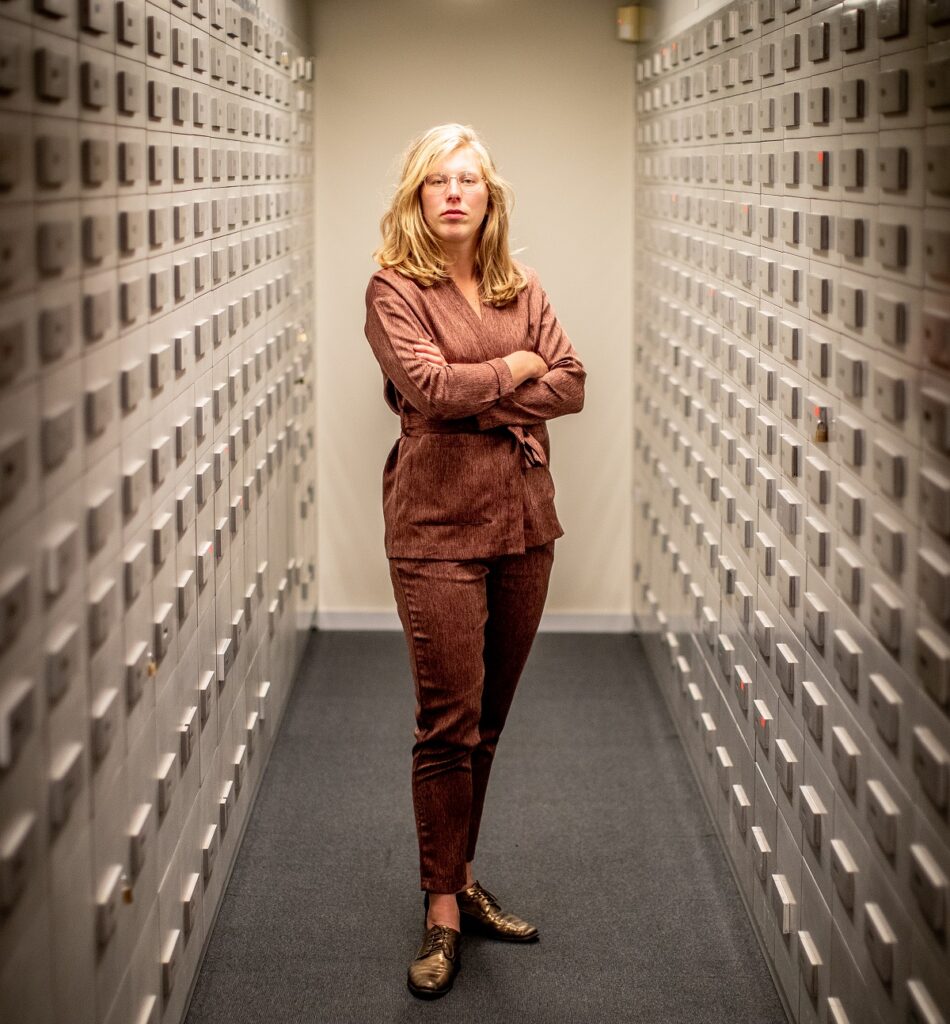 That turnaround came at the end of 2019 when Roof Food was in such a bad shape that Sabien had to take out a loan to save the business. “That was the wake-up call that I needed. Before that, I wasn’t paying enough attention to the numbers each day. Suddenly I had to, because Roof Food 3.0 was not an option; it was a matter of ‘now or never’.”
That turnaround came at the end of 2019 when Roof Food was in such a bad shape that Sabien had to take out a loan to save the business. “That was the wake-up call that I needed. Before that, I wasn’t paying enough attention to the numbers each day. Suddenly I had to, because Roof Food 3.0 was not an option; it was a matter of ‘now or never’.”
With the help of Happonomy, the non-profit organisation that strives to improve people’s quality of life by making them more aware of what matters in their lives and how the economy plays a role in this, Sabien came to the realisation that she needed to think more commercially. “Money was often tight at Roof Food, yet somehow we managed to keep going, through extra financing, a subsidy, or simply by paying ourselves slightly lower wages. Because of this, the issue was not on my radar. Although I believed that business was difficult because catering is a difficult sector, the core of the problem was that Roof Food was not a structurally healthy organisation. Without realising it, the lack of a structural long-term plan caused me a lot of stress.”
Commercial Thinking
Nowadays, Sabien sees it differently. “I realise now that money is merely a mechanism to run a business. Making money is not my motivation; it is a tool to achieve my end goal so I can create an impact. I even enjoy commercial thinking now. It gives me a boost to close good deals and create win-win situations. For example, I was asked to give a workshop during a networking event, for which the proceeds went to a sustainable, charitable cause. In the past, I would have done that for free. Now I charge my standard rate and give a discount if I like the project. It goes even further than that as I promised the organiser a hundred-euro discount for any customer who books a workshop at Roof Food during the event. I would never have dared to do such a thing in the past, but time has forced me to be more creative. I’ve come to realise that I now have to think like this all the time if I want to get ahead faster with Roof Food. I used to work myself to death and believed that I would get there.” Sabien laughs, adding, “Now I realise that, as an entrepreneur, it’s OK to be lazy too,”
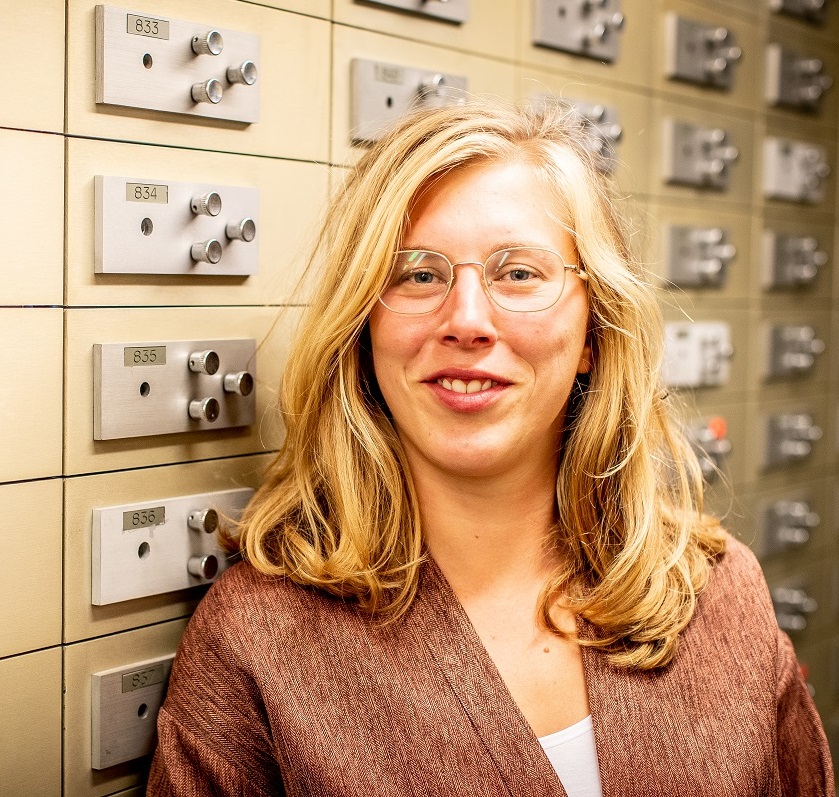 New role division
New role division
Sabien is very happy with the shift from manager to entrepreneur, adding, “Now I can fully concentrate on Roof Food’s mission to convince the city to grow more edible greenery. We want to convince as many people as possible about urban agriculture and roof gardens, and support interested parties in their individual projects. We carry out feasibility studies, design the roof garden, follow its construction closely, create a community and so on. Instead of doing a lot of the supporting tasks, I am now much more in the field and can also take the time to work on strategic plans.”
Sabien has given herself until the end of this year to get used to her new role division. She spends two days a week in building up her organisation and everything that goes with that, and she works on paid projects for the three remaining days. “I did learn my lesson. I now know the pitfalls of wanting to grow too fast. Before I venture into new projects, I’ve decided to fine-tune the structure of Roof Food.”
This story was created with the support of Circular Flanders, the Flemish policy-making organisation for a circular economy.
string(3) "yes" NULLRoof Food has been through a lot over the past five years. Fortunately, Sabien has been able to count on plenty of support from the board of directors, which also includes Alexander Naessens. Apart from being a founding partner, board member and a confidant, Alexander has been a believer from the very beginning. “Because I know Sabien so well, I know that she always does everything she can to move forward.
The fact that Alexander Naessens sits on the board of Roof Food is self-evident. Sabien and Alexander went to secondary school together, wrote a thesis on European monetary policy (even winning a prize for it) and started their professional career nine years ago at Delaware, the IT consultancy company, where Alexander is currently a manager. Even before Roof Food officially took off, Alexander co-authored the business plan. In addition to Sabien and Dany Neudt, he is a founding partner of Roof Food LLC, and so can be seen as a believer from the very beginning.
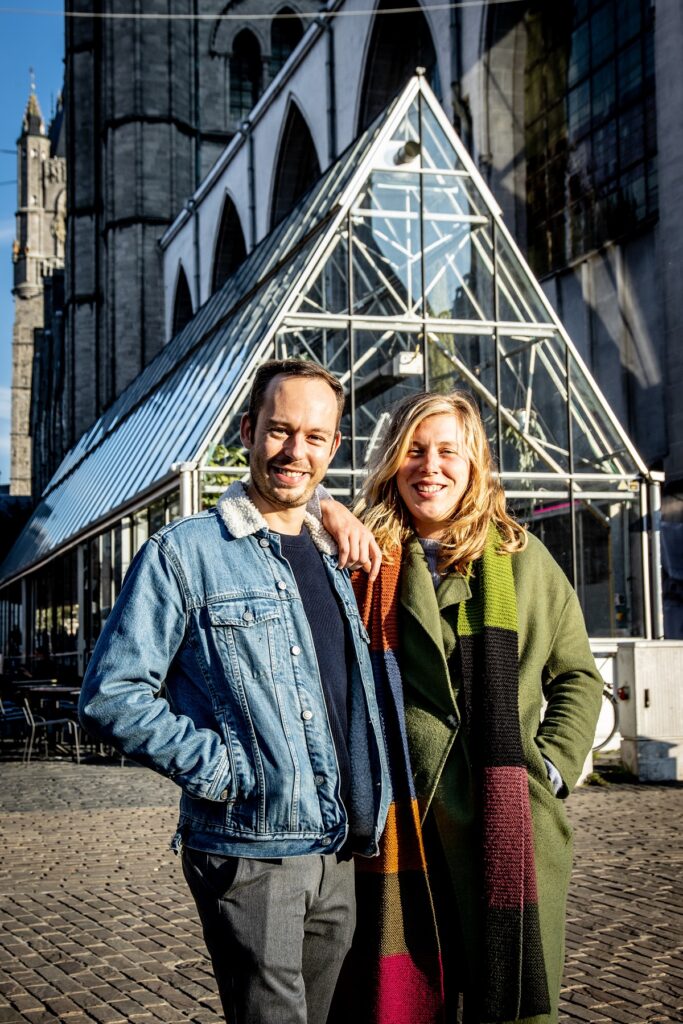 “For me, becoming co-founder of Roof Food was a logical step in my long friendship with Sabien. It was already clear during the writing of our thesis that we are a super good team. What’s more, it is very pleasant working with Sabien. I’m not such an enterprising type myself and would never dare to take the risks that Sabien does. However, through being on the board of directors, I can still experience everything up close and personal, which is very nice.”
“For me, becoming co-founder of Roof Food was a logical step in my long friendship with Sabien. It was already clear during the writing of our thesis that we are a super good team. What’s more, it is very pleasant working with Sabien. I’m not such an enterprising type myself and would never dare to take the risks that Sabien does. However, through being on the board of directors, I can still experience everything up close and personal, which is very nice.”
In the early years, the board of directors consisted of the three founder members: Sabien, Alexander and Dany. Pieter-Jan Van de Velde and Wim Beazar joined later as representatives of Trividend and Soif, two companies that invest in socially innovative organisations. In the past, meetings with the board of directors were not always easy for Sabien. As a start-up business, defining the role of the board of directors was not a priority and that certainly contributed to that.
Sabien: “It is naturally the task of the board of directors to be critical and to hold up a mirror to me and my ideas. Someone needs to keep an eye on the numbers and make sure that there is enough money in the account. I find that I do need something to motivate me. However, sometimes I had the feeling that the critical note prevailed over the constructive criticism and that I had to be accountable all the time. Maybe that’s just my personality or did I expect too much from the board of directors?
Alexander weighs in: “I understand that Sabien misses a certain form of confirmation from the board of directors. As board members, we first look at Roof Food as a company and only then do we look at Sabien as a person. In reality though, Roof Food is Sabien, and Sabien is Roof Food. This means that Sabien is the only variable that can change things and that puts a lot of pressure on her shoulders. Moreover, Sabien is extremely transparent, which is something that is certainly useful during a board of directors’ meeting. It is normal that Sabien needs a sounding board as she has to make many big decisions on her own. However, sometimes it is counterproductive to share too many details and it is better to just talk about the big picture.”
Sabien: “Don’t get me wrong. I have already received a lot of support from the board. In the end, a lot of responsibilities are on me, and it reassures me to know that there is a board above me that bears some of the responsibility. Each of the members has an extensive network and an interesting perspective on things. I get a lot out of these one-to-one contacts. Dany Neudt, the chairman of the board of directors, is a confidant, as is Alexander. Dany has a great deal of experience in leading meetings, communicating clearly, making decisions quickly. Before each board meeting, I call him to go over the items on the agenda and discuss the essentials. By the way, it was Dany who acted as interim manager while I was on sick leave for a few months. On top of all that, he was Head of Cabinet of the City, so it couldn’t have been easy.
Alexander sees another reason why the meetings can be difficult sometimes: “Due to all kinds of circumstances, Roof Food has had an unstable past where different paths were taken, such as the roof dinners and the catering. Roof Food had to reorient itself each time something happened. As a result, the meetings were never simple. Every month, fundamental decisions had to be made which we, as board members, had to think about even though we had no experience in the catering industry. Moreover, it was often difficult, because Sabien consistently stuck to Roof Food’s mission and vision. That made things ultra-complex. For example, Sabien wanted to supply meals to companies, although not in disposable packaging, so a whole process had to be set up around sustainable packaging. If it was just about the money, we would have just used cardboard trays and we could be Deliveroo by now! However, Roof Food’s mission sometimes clashed with the commercial aspect and that led to difficult decisions for the board of directors. It does make sense, of course, for a board of directors to want to stabilise the company, and to help it evolve and grow.” The fact that the board members had no experience in the hospitality sector did not make things any easier.
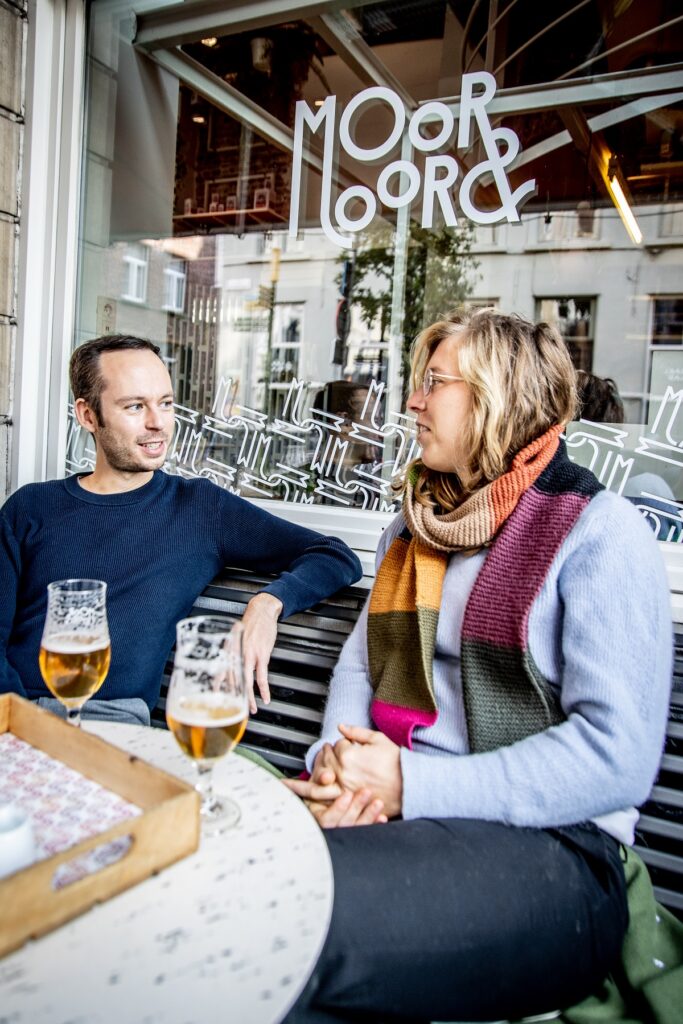 Sabien: “Catering in itself is a very specific sector with many challenges, yet a company that runs a rooftop vegetable garden and does catering is a completely different kettle of fish. There was no solid comparison material available anywhere. For example, it was very difficult to estimate what the construction of a roof vegetable garden would cost or how many daily specials we would sell each week. Would it be EUR 10, 50 or 500? It was so difficult to predict. We often lost time because I had to explain operational matters, such as how the kitchen was running, for example. Even though the board members often came up with very good ideas and advice, it usually led to a huge to-do list for me. In hindsight, we should have been assisted by experts in the field right from the start, because this is what we ended up doing with hospitality and marketing experts, Julie and Paquita.”
Sabien: “Catering in itself is a very specific sector with many challenges, yet a company that runs a rooftop vegetable garden and does catering is a completely different kettle of fish. There was no solid comparison material available anywhere. For example, it was very difficult to estimate what the construction of a roof vegetable garden would cost or how many daily specials we would sell each week. Would it be EUR 10, 50 or 500? It was so difficult to predict. We often lost time because I had to explain operational matters, such as how the kitchen was running, for example. Even though the board members often came up with very good ideas and advice, it usually led to a huge to-do list for me. In hindsight, we should have been assisted by experts in the field right from the start, because this is what we ended up doing with hospitality and marketing experts, Julie and Paquita.”
Sabien has recently started focusing on consultancy in roof vegetable gardens and things are going much more smoothly at the moment.
Sabien: “Since we stopped catering this spring, partly due to the coronavirus pandemic, we have not received a single catering request, although we have received five requests for a roof vegetable garden project. I think it’s awesome that you can turn your business around completely, from catering to consultancy, in such a short space of time. It can be said that Roof Food’s business model has changed, although its values and mission have remained unchanged, which is to make the city greener in its food production styles and to introduce people to healthy food. For me, this is verified by the fact that, unlike today, there was no market for roof vegetable gardens five years ago. I feel that the momentum is there now and that is important for an entrepreneur. Now that things are going better, the meetings with the board of directors will also be more stable and structured. It is no longer necessary to meet every month and discuss every EUR 5,000, for instance.
Alexander: “Although Sabien never wanted to be the manager of a catering company, it was not possible to do what we are doing today at that time. It is thanks to the experiences of the past few years that Sabien has become an expert. Those lessons have given her the knowledge and credibility to turn Roof Food into a stable and commercially successful company. In six months’ time she will have succeeded in realising four new roof vegetable gardens in the city, which shows that the mission and vision of Roof Food are being realised now more than ever. If we had started Roof Food today according to the initial business plan, we would definitely have succeeded. The time just wasn’t right (or ripe even) back then.
This story was created with the support of Circular Flanders, the Flemish policy-making organisation for a circular economy.
string(3) "yes" NULLRoof Food is going through a change. After the roof dinners and the catering, the company is gradually evolving into a consultancy for organisations and entrepreneurs who are interested in their own roof vegetable gardens. This new positioning requires even more knowledge and expertise from Sabien about all facets of urban agriculture. She acquires this from books, conversations and examples from home and abroad.
A Jack-of-all-trades
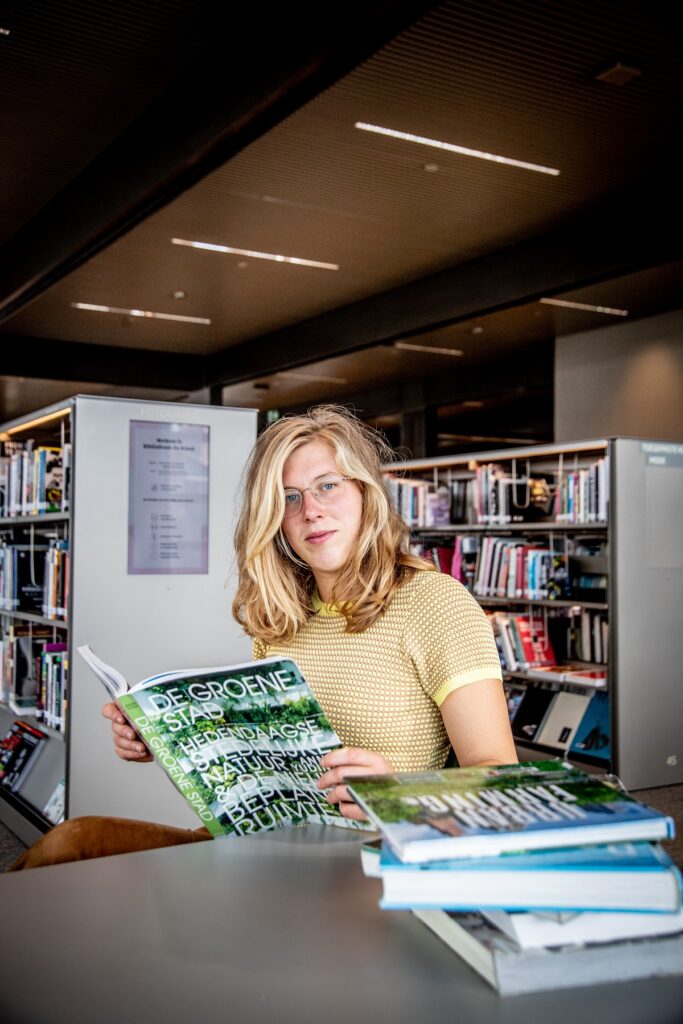 “Roof Food is not a pure roof vegetable garden landscaper,” says Sabien. “Roof Food wants to profile itself as a specialist in roof vegetable gardens, both in design and construction, and also in commercial exploitation. We want to inspire entrepreneurs to start their own projects and help organisations such as property owners or project developers with their own business cases for their roofs. This means that I must be a Jack-of-all-trades.”
“Roof Food is not a pure roof vegetable garden landscaper,” says Sabien. “Roof Food wants to profile itself as a specialist in roof vegetable gardens, both in design and construction, and also in commercial exploitation. We want to inspire entrepreneurs to start their own projects and help organisations such as property owners or project developers with their own business cases for their roofs. This means that I must be a Jack-of-all-trades.”
Every potential new project starts with a technical feasibility study and Sabien adds, “During the first visit, we check whether the roof is suitable to carry a vegetable garden. If that is not the case, the story ends right there and then. For such a study, we work together with a structural stability consultant. However, in order to understand the subject matter and to be able to ask the right questions, I have to focus on that aspect.
This involves very technical matters such as roof construction, roof sealing, drainage, fire safety and so on. I get this knowledge from conversations with technicians and construction professionals or from books and reports of the Scientific and Technical Construction Centre (WTCB). Fortunately, it doesn’t feel like a task, as I really enjoy exploring new topics.”
Consultancy from start to finish
The consultancy part of Roof Food encompasses much more than just technical advice and the design of roof vegetable gardens. In order to achieve Roof Food’s mission (the greening and cooling of the city and the promotion of short-chain and biodiversity), Sabien sees it as being something much bigger. She wants to support building promoters, retailers and governments etc. with their urban agriculture projects from start to finish. Each project starts with a workshop on urban agriculture and real estate. In half a day, Sabien looks at the possible models together with the client and any other parties involved and looks at which model best fits the case, and also at any technical implications there might be.
This gives her a better insight into the scope and vision of the project. She then gives advice on all facets of the business case, i.e., the concept, the plan, the investments, the economic feasibility, the infrastructure, the garden design, and the construction and realisation. “Urban agriculture needs a more commercial approach and my favourite part of the job is to join in with the thinking process about the concept and then looking at the business opportunities.
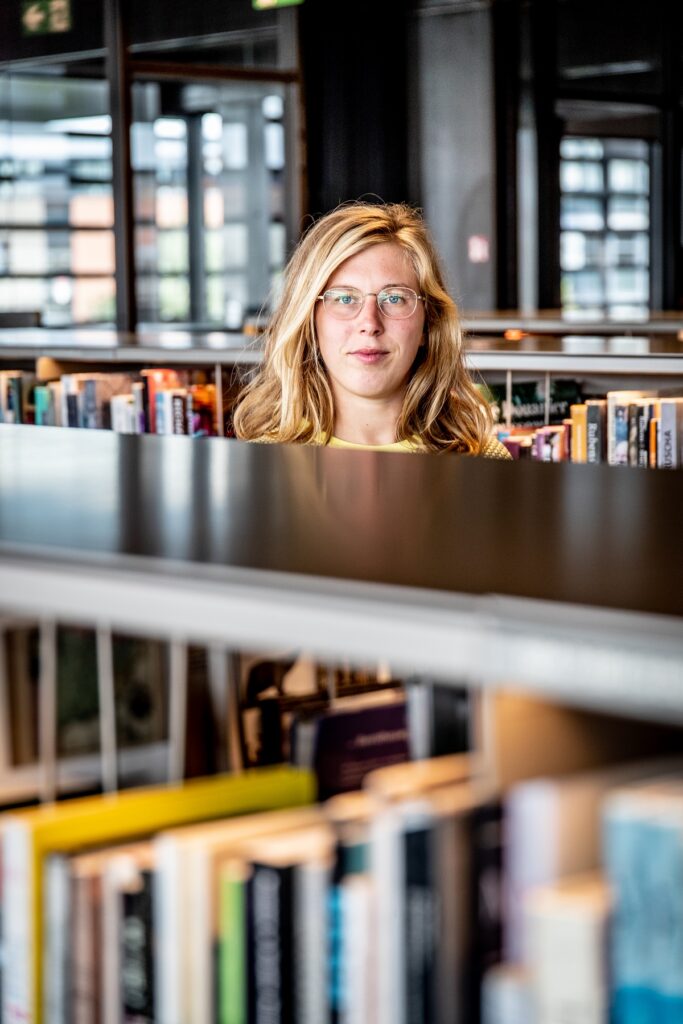
Green roofs as a revenue model
Sabien relies on her experiences with Roof Food for this business-related advice and draws inspiration from other national and international initiatives. Together with Jonathan, she regularly attends lectures and festivals on urban agriculture or similar projects. Sabien knows that, across the board, the Netherlands is much further ahead in terms of urban agriculture and green roofs than we are. For example, the Netherlands has the non-profit organisation Dakdorpen (Roof Villages), which wants to build small and sustainable houses on the unused flat roofs of Rotterdam. Using the rental income, the roofs can each be fitted with a green roof. In this way, expensive green roofs can become a revenue model.
Sabien’s greatest example, however, is Brooklyn Grange in New York. This company operates the world’s largest roof farms on three roofs in New York and grows more than 45,000 kilograms of organic produce every year. In addition to growing and distributing fresh local vegetables and herbs, Brooklyn Grange also organises events, training courses, as well as designing, installing and maintaining green roofs for customers. Sabien adds, “I would very much like to visit their farms and talk to the founders. Their philosophy is the same as that of Roof Food, in that urban agriculture is a viable industry which only benefits the many different stakeholders”.
This story was created with the support of Circular Flanders, the Flemish policy-making organisation for a circular economy.
string(3) "yes" NULL string(3) "yes"Mollit duis Lorem amet veniam minim ad.Voluptate commodo labore aliqua quis esse aliqua.Veniam tempor elit velit non.